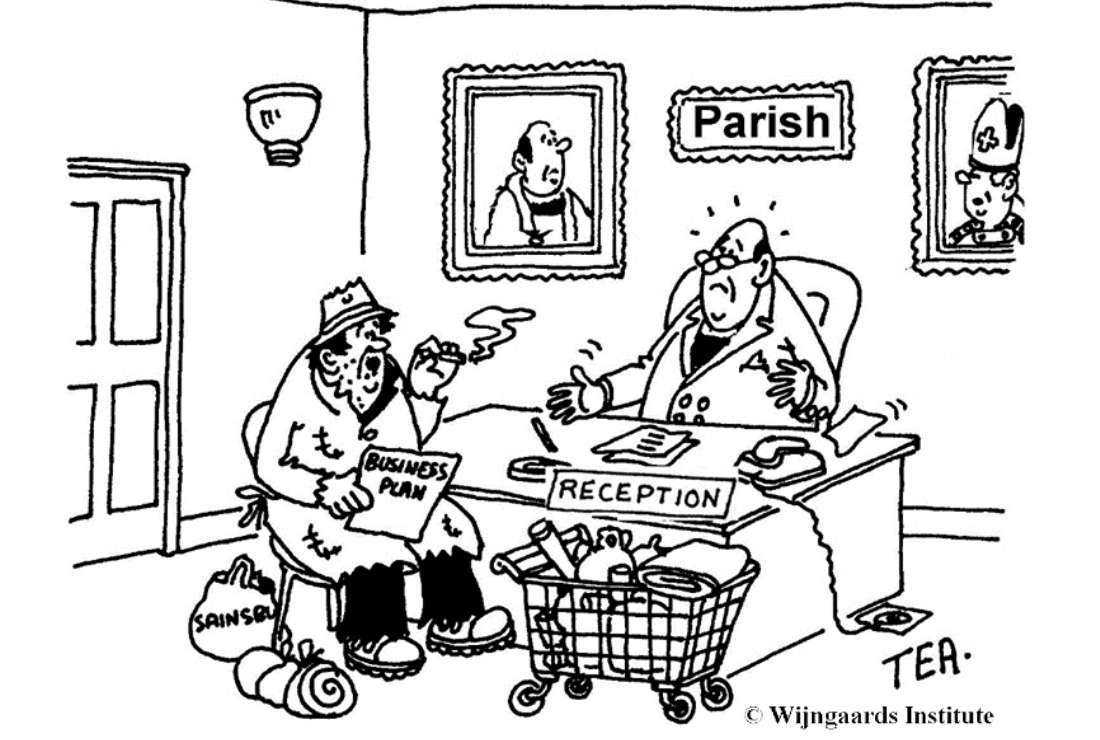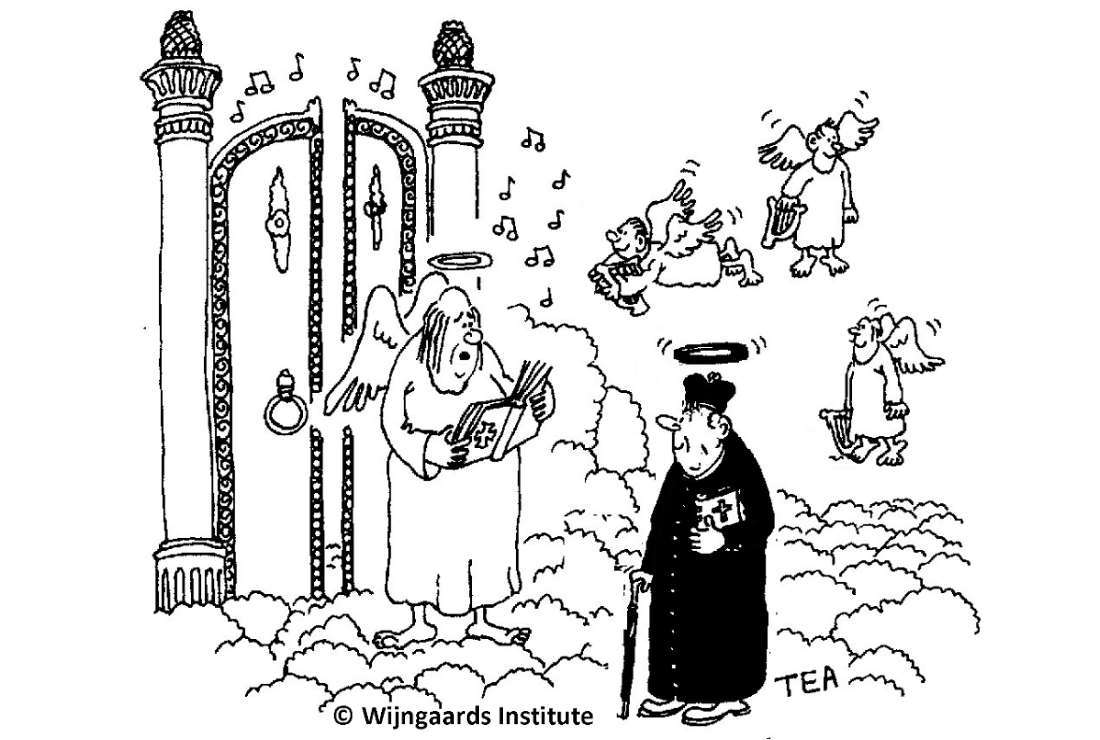Has the ‘teaching authority’ of the Church not during recent centuries in actual fact totally ignored the ‘sense of faith’?

"My sense of faith tells me that you can find me somewhere to sleep." (Illustration: Tom Adcock)
"People can be forgiven any sin and any evil thing they say: but whoever says evil things against the Holy Spirit will not be forgiven. Anyone who says something about the Son of Man will be forgiven; but whoever says something against the Holy Spirit will not be forgiven, now or ever.” (Mathew 12,31-32)
I was born on a hot steamy monsoon day in St. Vincent de Paul Hospital in Surabaya, Indonesia, then still known as the Dutch East Indies. The date was Monday, Sept. 30, 1935. My parents were Dutch. My father served as headmaster of a primary school that had both Dutch speaking and Malay speaking sections.
When my mother had been wheeled back from the delivery room to the ward, a clash occurred with parish authorities. The details of the event were duly recorded in my family records. My parents were devout Catholics and daily communicants whenever possible. So my mother requested to be brought Holy Communion next day as was her custom.
“Out of the question!”, the religious sister in hospital stated, refusing to put her on the list for Holy Communion. “You have not been churched!”
Those were the days when ‘churching’ was still practiced by Catholics in many countries. This atrocious custom was the outcome of ancient fears surrounding childbirth joined to medieval prejudice based on Leviticus 12,2-8. After childbirth, a woman was deemed unclean. A young mum would present herself forty days after delivery at the church door with a lighted candle in one hand and an offering in the other. Only when a priest had blessed her, thus purifying her from all menstrual stains could she again participate in the Eucharist. It also meant that a mother was prevented from attending the baptism of her newborn child which took place in church soon after birth.
My mother who had seen her own mum who had nine children being churched many a time, had sworn that she herself would never submit to the rite.
“I don’t need to be churched”, she asserted.
“But you’re unclean. You don’t want to disgrace the Blessed Sacrament do you?”
“I’ve just done the most wonderful thing in my life and given birth to a child”, my mother retorted. “Why would I need to be cleansed?”
The sister did not want to give in. Nor did my mother. She insisted that the parish priest be called. Father Jan Zoetmuller of Sacred Heart parish dutifully arrived. More words followed as he too tried to persuade her. To no avail. My mother insisted that he bring her Communion as before.
Next morning on Tuesday, Oct. 1, 1935, my mother received Holy Communion as usual. Afterwards she was present when the parish priest baptised me in the chapel of the hospital.
The point of the story is that my mother had not been theologically trained. No one had told her that ‘churching’ was not right. She simply knew it was wrong. She knew it from the deep ‘sense of faith’ she carried in her heart. And she was proved right. After the Second Vatican Council ‘churching’ has been totally abolished.
The ‘sense of faith’
How do we know what truly belongs to our Catholic faith? Is it only what priests, bishops, the pope tell us? No. An important source lies in our hearts and minds. In the past it has been called the ‘sense of faith’, the ‘sense of the faithful’, the ‘Gospel in the heart’, the ‘Catholic sense’, the ‘ecclesiastical spirit’, the ‘sense of the Church’, or sometimes the ‘consensus of the Church’, remembering that in these last expressions ‘church’ stands for the whole community of believers. Tradition has always stressed the crucial role which the ‘sense of faith’ plays in the life of the Church. For it is alive and aware.
The sense of faith in our hearts does not just carry a bundle of old truths. Under guidance of the Spirit it tests new developments and it assesses their value. Our minds come across new problems and fresh possibilities, which makes our faith blossom with an enriched vision. It leads to reaction to old truths, adaptation, growth and fruitfulness. This makes Christian tradition a living tradition, alive because it opens up to wider horizons while facing questions that need answering. The sense of faith is the people of God’s awareness, an ever renewed awareness.
The Second Vatican Council teaches that this ‘sense of faith’ lies at the root of infallibility/inerrancy:
“The body of the faithful as a whole, anointed as they are by the Holy One [cf. 1 John 2,20.27], cannot err in matters of belief. Thanks to a supernatural sense of the faith which characterizes the People as a whole, it manifests this unerring quality when ‘from the bishops down to the last member of the laity’, it shows universal agreement in matters of faith and morals. For, by this sense of faith which is aroused and sustained by the Spirit of truth, God’s People accept not the word of human beings, but the very Word of God [cf. 1 Thessalonians 2,13]. It clings without fail to the faith once delivered to the saints, penetrates it more deeply by accurate insights, and applies it more thoroughly to life” (Lumen Gentium 12).
Some Vatican documents in recent decades have attempted to minimize the impact of the ‘sense of faith’. They stipulate that the pope, bishops, priests must agree. They reject the value of polls. They list qualities a Catholic must possess before his or her ‘sense of faith’ counts. And, of course, it is true. Someone’s ‘sense of faith’ can at times be misguided. But what about the danger of underrating it?
What did Jesus think about it?
All Jesus’ preaching and miracles were a manifestation of the Spirit. “The Spirit of God is upon me. The Spirit has anointed me to preach the good news to the poor. The Spirit has sent Me to proclaim liberty to the captives” (Luke 4,18). Notice that Jesus says he was anointed by God’s Spirit. Anointment was a ritual to give someone an official position, like a priest or a king.
When Jesus talks to Nicodemus, he explains to him that through baptism a person is born again, the second birth being not of an earthly mother but of the Spirit. “Truly I tell you, no one can enter the kingdom of God unless they are born of water and the Spirit. Flesh gives birth to flesh, but the Spirit gives birth to Spirit. You should not be surprised at my saying, ‘You must be born again.’ The wind blows wherever it pleases. You hear its sound, but you cannot tell where it comes from or where it is going. So it is with everyone born of the Spirit” (John 3,5-8).
At the Last Supper, Jesus confirms this again: “I will ask the Father and he will give you another helper, the Spirit of Truth to remain with you forever. The world did not receive the Spirit, because it cannot see the Spirit and know the Spirit. But you know the Spirit, for the Spirit remains with you and lives in you” (John 14,16-17).
It is through the Spirit that every one of the faithful has that deep sense of faith by which he or she knows what is in line with what Jesus taught, with the Father’s kingdom of love which he came to bring about.
The first letter of John expresses very clearly that this results in a degree of inerrancy: “As for you, the anointing you received from him remains in you and you do not need anyone to teach you. But just as his true and genuine anointing teaches you all about things, so remain in him as you have been taught” (1 John 2,27).
Questions
- Has the ‘teaching authority’ of the Church not during recent centuries in actual fact totally ignored the ‘sense of faith’?
- And why reject information provided by polls? Many polls are quite sophisticated. If, as they reveal, up to 70 % of church-going Catholics in major countries believe women should be ordained priests, may these results just be dismissed out of hand?
Published by arrangement with the Wijngaards Institute for Catholic Research
*The views expressed in this article are those of the author and do not necessarily reflect the official editorial position of UCA News.










